A while ago, Harvard’s Nieman Journalism Lab ran a piece about the New York Times’ digital branding efforts. It quoted a series of tweets by Max Pfennighaus, who is the executive creative director of brand and marketing at the Times and previously held a similar position at NPR, and whose job is to build the newspaper’s digital brand. He described the core challenge as the “grandpa in a nightclub” problem.
“Being a beloved brand is a double-edged sword….” Pfennighaus (@MxPf) tweeted. “If they love you as the Grey Lady, then they have a hard time seeing you nerding out with clever apps. It’s like seeing your grandpa at a nightclub…. Every single thing we do as an organization should avoid the “nightclub grandpa” effect if we hope to survive the next decade. If you’re happy being and acting like a grandpa, don’t go to a nightclub. Otherwise…well, consciously work towards not being a grandpa.”
I bit:
@thischairrocks – Why shouldn’t older people go to nightclubs?”
@MxPf – “they shouldn’t. it’s a metaphor.
@thischairrocks – “They shouldn’t” is no metaphor, it’s a directive. And why shouldn’t they?
@MxPf – go back a few tweets, it’ll make more sense. i suspect you stumbled across this thread because of the search term grandpa.
@thischairrocks – Actually several people brought it to my attention because of the ageist language. Let’s discuss via email:ashton@thischairrocks.com
@MxPf – but it’s a conversation about marketing, not actual grandparents. of which i have several.
@thischairrocks – The fact that it’s about marketing doesn’t make the analogy less problematic.
@MxPf – @thischairrocks don’t take anything I said literally. Everyone should go to clubs as much as they like.
Maybe Pfennighaus means it. Maybe he’ll even retire his repellent metaphor. The grandpa-in-a-nightclub “problem” is the woman-in-a-boardroom “problem.” The black-person-in-a-country-club “problem.” The developmentally-delayed-kid-in-a-classroom “problem.” The gay-person-in-a-locker-room “problem.” It’s not that the outlier should stay home; it’s that the discriminatory model, once again, has to change.
It’s deeply troubling that Pfennighaus’s language went unchallenged by one of the country’s most progressive media outlets, the New York Times, not to mention Harvard University. I guess they’re too busy “consciously work[ing] towards not being a grandpa,” whatever retrograde contortions that might involve. I’ll take being a grandmother any day—one who loves being a grandmother and also loves clubbing. Some people will be snarky about that, like the bouncer outside a club on a frigid February night, where we were shivering in line with a bunch of friends celebrating a 40th birthday. “Step up, Grandpa,” he said to my partner.
Bob went over to him and said, “I understand that they’re not the same thing, but calling me ‘Grandpa’ in this context feels like what I imagine it would be like for someone to call you the N-word.”
The bouncer thought it over, nodded, said, “I got it.”
“I am a grandfather, by the way,” Bob added, “and proud of it.”
Everyone learned something.



